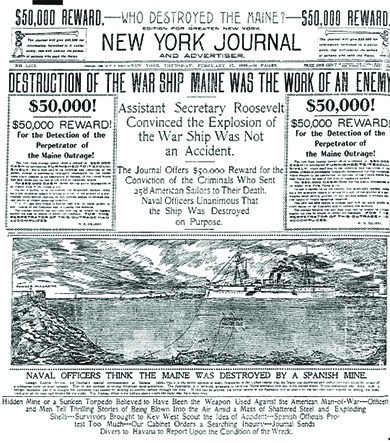| << Chapter < Page | Chapter >> Page > |
However, even as sensationalist news stories fanned the public’s desire to try out their new navy while supporting freedom, one key figure remained unmoved. President William McKinley, despite commanding a new, powerful navy, also recognized that the new fleet—and soldiers—were untested. Preparing for a reelection bid in 1900, McKinley did not see a potential war with Spain, acknowledged to be the most powerful naval force in the world, as a good bet. McKinley did publicly admonish Spain for its actions against the rebels, and urged Spain to find a peaceful solution in Cuba, but he remained resistant to public pressure for American military intervention.
McKinley’s reticence to involve the United States changed in February 1898. He had ordered one of the newest navy battleships, the USS Maine , to drop anchor off the coast of Cuba in order to observe the situation, and to prepare to evacuate American citizens from Cuba if necessary. Just days after it arrived, on February 15, an explosion destroyed the Maine , killing over 250 American sailors ( [link] ). Immediately, yellow journalists jumped on the headline that the explosion was the result of a Spanish attack, and that all Americans should rally to war. The newspaper battle cry quickly emerged, “Remember the Maine!” Recent examinations of the evidence of that time have led many historians to conclude that the explosion was likely an accident due to the storage of gun powder close to the very hot boilers. But in 1898, without ready evidence, the newspapers called for a war that would sell papers, and the American public rallied behind the cry.

Visit U.S. History Scene to understand different perspectives on the role of yellow journalism in the Spanish-American War.
McKinley made one final effort to avoid war, when late in March, he called on Spain to end its policy of concentrating the native population in military camps in Cuba, and to formally declare Cuba’s independence. Spain refused, leaving McKinley little choice but to request a declaration of war from Congress. Congress received McKinley’s war message, and on April 19, 1898, they officially recognized Cuba’s independence and authorized McKinley to use military force to remove Spain from the island. Equally important, Congress passed the Teller Amendment to the resolution, which stated that the United States would not annex Cuba following the war.
The Spanish-American War lasted approximately ten weeks, and the outcome was clear: The United States triumphed in its goal of helping liberate Cuba from Spanish control. Despite the positive result, the conflict did present significant challenges to the United States military. Although the new navy was powerful, the ships were, as McKinley feared, largely untested. Similarly untested were the American soldiers. The country had fewer than thirty thousand soldiers and sailors, many of whom were unprepared to do battle with a formidable opponent. But volunteers sought to make up the difference. Over one million American men—many lacking a uniform and coming equipped with their own guns—quickly answered McKinley’s call for able-bodied men. Nearly ten thousand African American men also volunteered for service, despite the segregated conditions and additional hardships they faced, including violent uprisings at a few American bases before they departed for Cuba. The government, although grateful for the volunteer effort, was still unprepared to feed and supply such a force, and many suffered malnutrition and malaria for their sacrifice.

Notification Switch
Would you like to follow the 'U.s. history' conversation and receive update notifications?